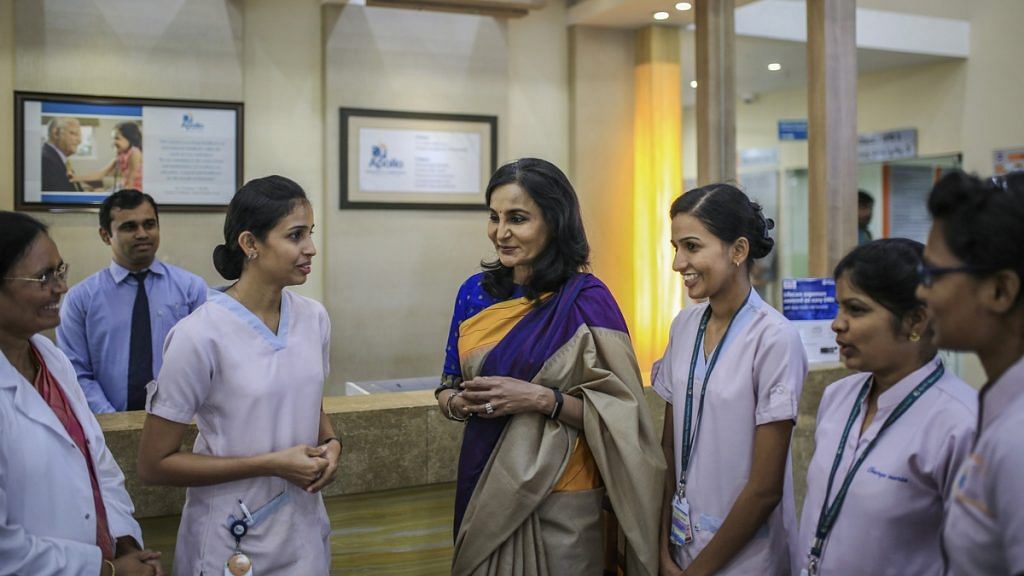New Delhi: Capping charges on hospital treatment of Covid-19 is “unfair” as it also entails treating underlying co-morbidities, said Apollo Hospitals Managing Director Suneeta Reddy.
Her comments come at a time when many state governments, including Delhi, Tamil Nadu, Karnataka, Telangana and Maharashtra, have moved to cap charges on Covid treatment in a bid to keep treatment costs affordable.
“I don’t think it is a good idea. When the cure protocols for Covid-19 are not yet defined, you can’t cap a cost because you don’t know how much cost goes to each patient,” said Reddy in an interview to ThePrint over Skype.
“While treating Covid-19, if we were just to say that we are treating a flu that requires hydroxychloroquine and paracetamol, it is fine. But here we are treating patients with underlying co-morbidities. It will be very unfair to put a cap on the price,” she said.
She pointed out that the focus has to be on providing the best clinical outcomes for the patients.
“I don’t want the doctors to think about the costs of the treatment. I want the doctors to be delivering the best treatment to the patient,” she said, adding that many of the hospital’s patients can afford to pay.
“They are either covered by insurance or have kept aside money for such events,” she said, adding that the hospitals can ill-afford to lose more money at this point.
Apollo Hospitals is a multispeciality healthcare group with over 70 hospitals across the country with 12,000 beds. The group also has pharmacies, primary care and diagnostic clinics, and telemedicine units, according to its website.
Also read: Over 2 lakh daily tests, 8.1% positivity rate, 2.7 lakh recoveries — India’s Covid numbers
‘Not the right time to raise import duties’
Reddy also said it is not the right time to raise import duties as India is still reliant on not just China but other countries as well, especially when it comes to the healthcare sector.
“We have already faced a double whammy — the 5 per cent health cess on import of medical equipment and the depreciation of the rupee … so this is probably not the right time to think about it,” she said.
Finance Minister Nirmala Sitharaman had announced a health cess on import of medical equipment in her 1 February budget, raising costs for all hospital chains as India mostly imports high-end medical equipment.
Apollo to focus on consolidation, digital push
Apollo Hospitals is looking to consolidate its existing business and conserving capital this year as it moves ahead with its digital push, Reddy said.
“We are being careful and conservative this year … we are very cognisant of cash flows. And we are on a plan to do significant cost cutting,” she said. The prospects of the healthcare sector should improve after December, she added.
Apollo is using its digital platform to provide ‘tele-consult’ and home care.
“I think the future of healthcare is clearly in digital and in moving into people’s homes. As the pandemic worsens, people will be afraid to bring out the vulnerable population into public spaces,” she said.
“So we want to take home nursing, home care, and tele-consults into their homes. We have started doing this and are probably the only pan-India player to do this successfully,” she said.
Also read: Lancet study finds stroke, depression, anxiety in both young and old Covid patients
‘Need to increase healthcare investment’
Reddy also stressed on the need for the government to create an environment that will facilitate additional investment into healthcare infrastructure.
The sector should get the support the information technology sector received many years ago. This will mean India would be well prepared to handle any future pandemics, she said, pointing out that Covid-19 may not be the last of the pandemics the world will see.
“We are hopeful that we will be able to work with the government. So that we’ll be prepared, because I don’t believe that we are seeing the end of pandemics with Covid,” she said.
Reddy cited the example of Japan and how the country managed to contain the Covid spread through testing, wearing masks and physical distancing. In India, the containment of the pandemic in the Dharavi slums of Mumbai may also become a case study in the future, she added.
Also read: India missed detection of 3 lakh TB cases in 2019, but this is why it’s good news
